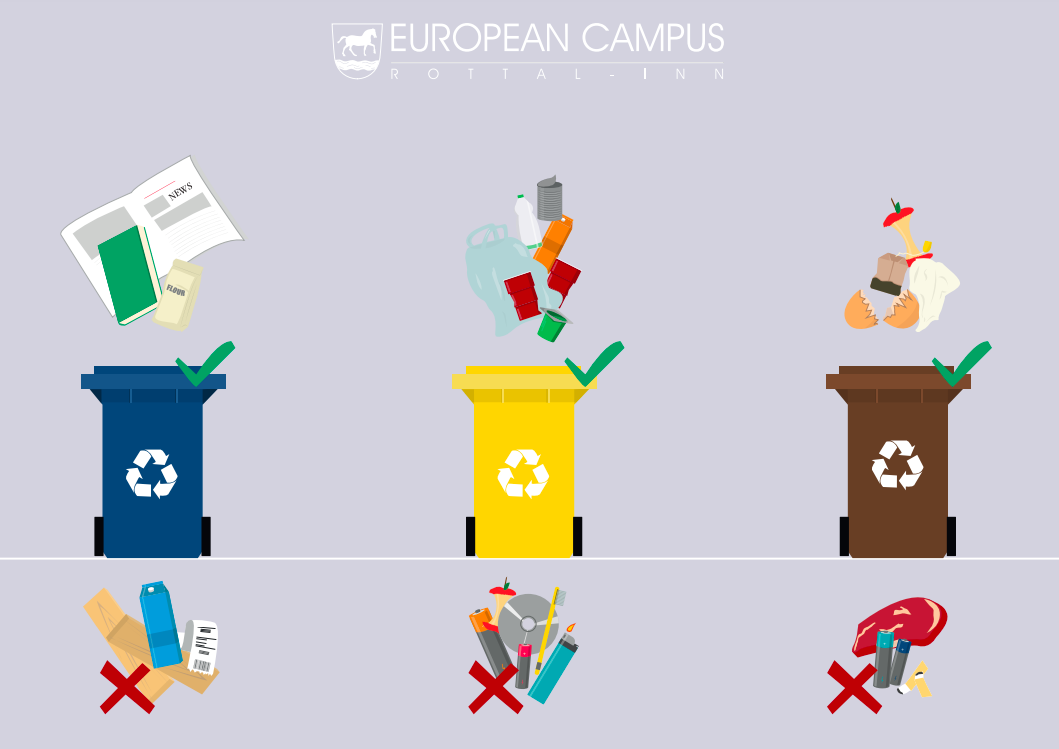All News
Life in Rottal-Inn
Summer is Coming!
Where can you take a break from learning or also study in a beautiful environment
Everybody who has ever had to sit for exams in summer period knows how extremely stressful this is: with temperatures rising and air conditioners practically inexistant (thank you, Germany…) concentrating can be one of the most difficult parts of passing these exams.
What place are we talking about?
Well, today we bring you a quick review about the Badesee Bad Birnbach.
Copyright: Lena Stallhofer / Bad Birnach
If you can understand some German, you have probably realised that it literally means “bathing lake Bad Birnbach” and that is exactly what it is.
Located just 15 minutes by car, 20 by train (train stop is 8 minutes walking from the lake), or 45 by bike from Pfarrkirchen, this lovely and small lake allows you to cool down under a tree and (something that is NOT allowed in the Rottaunsee) swim! Perfect to bring that summer temperature down!
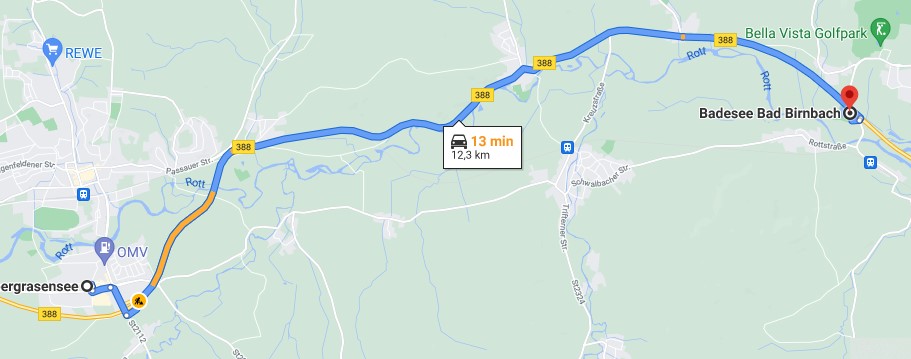
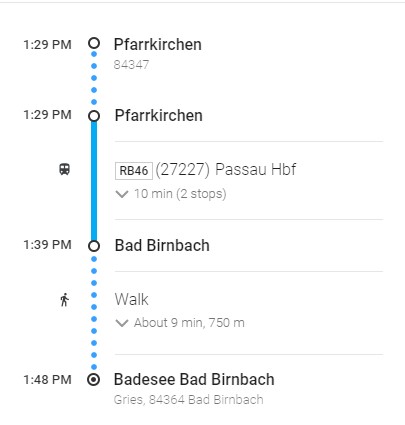

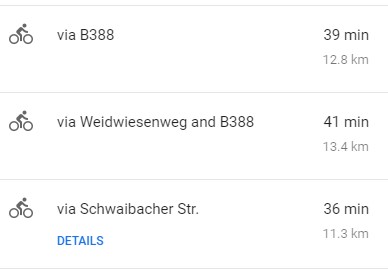
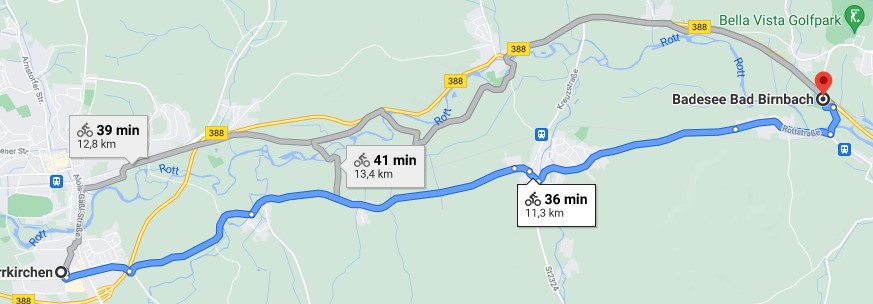
As it is in a very small and quite town, not a lot of people visit it. Perfect if you want some quiet summer paradise! And also, great for studying in there.
The green areas near the lake are vast, so you will have no problem finding a quiet spot to sit by yourself, not being interrupted by anybody.
Copyright: Lena Stallhofer / Bad Birnach
Just one recommendation: bring your own drinks and food. The nearest supermarket is around 30 minutes walking, so either stop on your way to the lake for provisions or bring them from home. And remember: pet and fireplaces are forbidden in this lake.
The place has bathrooms, changing rooms and a small kid´s playground. Everything you need to spend a quiet day there.
Coyright: Bad Birnbach spa administration / Bad Birnbach
The lake is opened daily from 9 am till 10 pm, and if you have any other questions you can easily contact them at: kurverwaltung@badbirnbach.de or call them at +49 8563 963046.
For more information, you can also visit their webpage at www.badbirnbach.de
If you want something more local, don´t forget our other posts on what to know about Pfarrkirchen, places to exercise in Pfarrkirchen, and many others!
Ayelen Toscano Juanes • 26.06.2021
Vereine
Associations in Germany
You have at least six friends with whom you share interests?
Why don’t you found a registered association (eingetragener Verein)?
Seven people that’s the minimum number of a Verein (association). In Germany there are about 600 000 associations,
and every second German citizen is member of at least one. They have been found for very different reasons. Most Vereine are for any kind of sports, especially soccer clubs are very popular, but in Germany you can find a Verein for nearly
everything: charities, environmental or human rights organizations, groups for various hobbies, artistic or cultural associations, remembrance committees, garden allotments, citizens’ initiatives, self-help groups, carnival clubs – just to
name a few. However important things like civil protection is organised in associations like e. g. Fire Fighters in rural areas. Germany’s largest association is the ADAC (German Automobile Club) with over 20 million members whereas the majority
of German Vereine are small ones with approximately 100 members at a max.
Where do associations come from and how do they work?
The first known Vereine were noted in the 17th and 18th centuries which were associations for literature which aimed to maintain culture and education. In 1848 the first laws for associations (Vereinsrecht) have been passed in Germany. Although, most people work voluntarily in associations the laws are quite strict. Usually, members need to pay a membership fee to finance the association’s disbursements. For what the Verein does spend its money is the discission of the executive board which runs the Verein. This board is called Vorstandschaft and consists of several members which get elected every few years. There need to be e.g. a treasurer (Kassenwart), a secretary (Schriftführer), observers (Beisitzer) and a president (Vorstand) who is responsible for everything. Sometimes there can also be extra members in the board who are for example responsible for the youth of the association (Jugendwart). Of course, you need a substitute for every position. At least once a year, there needs to be a general assembly (Jahreshauptversammlung) where all members meet and discuss the association’s current affairs or elect the board. All the regulations for the election or for basically everything about the Verein are defined in the constitution of the association.
Why do people join associations?
Granted, all these regulations might do not really sound fun, but a Verein is more than that. Being member in an association means meeting new people with the same interests, doing activities together, enjoying your spare time and maybe even becoming friends. Especially, when you just moved to a city it is always a good idea to join a Verein. In Pfarrkirchen there are several associations, too. If you are interested in sports, you could maybe join the TuS 1860 Pfarrkirchen, the DJK Sportfreunde Reichenberg (both associations for different kinds of sports), the Tennisclub Pfarrkirchen (a tennis club), the Bachschützen Degernbach (a sports shooting association), Alpenverein (mountain association) or the Luftsportclub Pfarrkirchen (a gilding association). Those not interested in physical activity might want to engage in the Tierschutzverein Rottal-Inn (a animal welfare organization), in the Freiwillige Feuerwehr Pfarrkirchen (volunteer fire brigade) or Spielecafe (game club).
List of assosiactions in Pfarrkirchen: https://pfarrkirchen.de/vereine.133.html
RESP e.V.: https://www.facebook.com/respev
Pauline Kreis 29.04.2022
O’zapft is!
That’s the popular shout out visitors of Bavarian beer festivals look forward to. It is said when the first barrel of beer is broached. After this moment everyone can get one of the typical beer jugs containing a whole litre called Mass. Of course, you can also have a so called Radler-Mass which is half beer half lemonade. Usually, this formal opening of these festivals named Volksfest is accompanied by a traditional brass band which frequently invites the crowd to toast with the word “Prost”. In Bavaria there are Volksfeste in nearly every city. People normally wear folk costumes to go there. Traditionally, girls wear dresses called Dirndl and boys wear trousers made of leather called Lederhose.
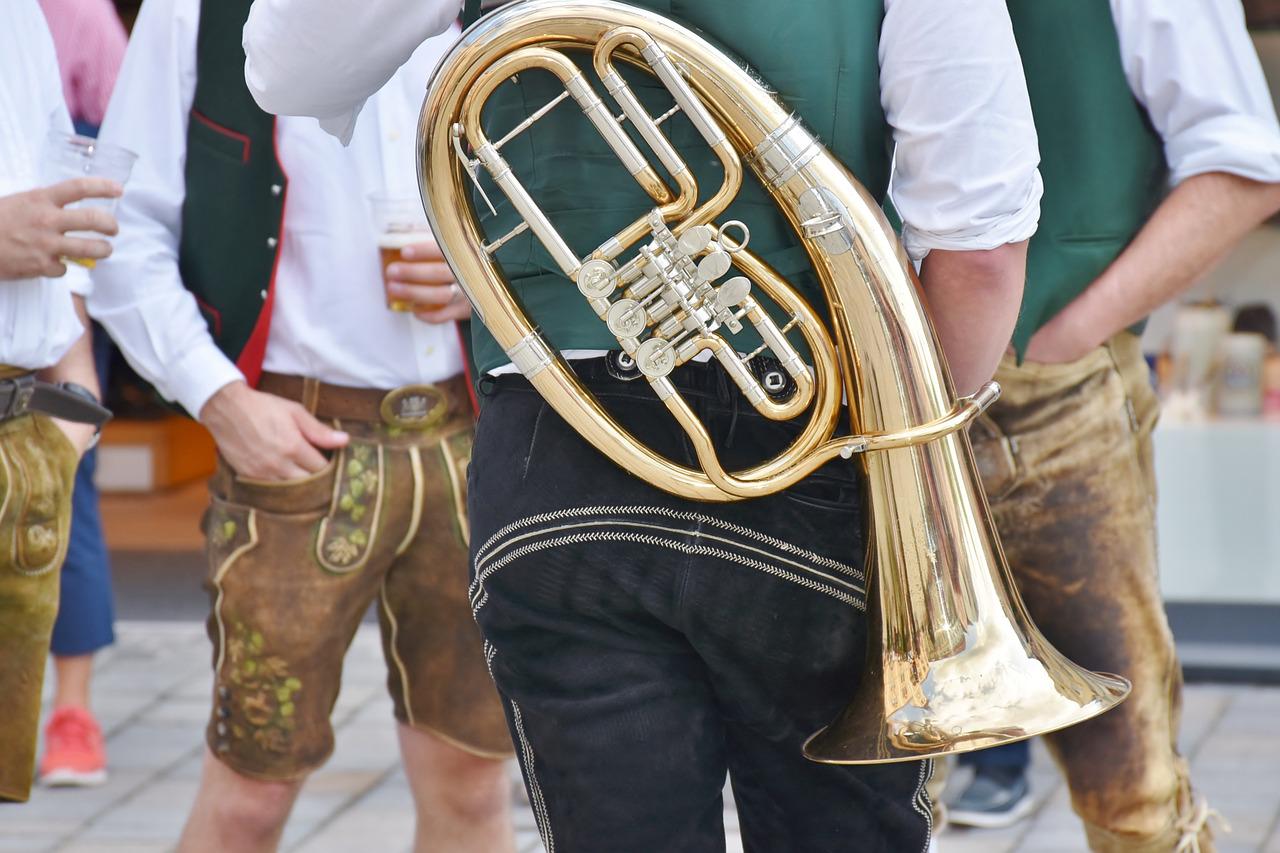
The biggest and most popular Volksfest in Bavaria surely is the Oktoberfest in Munich. But there are other smaller fairs, too. In the region of Rottal-Inn there is the Karpfhamer Volksfest in August.
The Gäubodenfest in Straubing also taking place in August is worth a visit, too, as well as the Dult in Passau taking place twice a year in spring and in autumn.
Find here some of the Volksfeste in the region:
- Eggenfelden: Gerner Dult 16. bis 25. April 2022
- Passau: 29. April 2022 – 08. Mai 2022
- Landshut: Landshuter Frühjahrsdult 29. April bis 8. Mai 2022
- Straubing: Gäubodenvolksfest Straubing 12. - 22. August 2022
- Karpfham: 1. - 6. September 2022
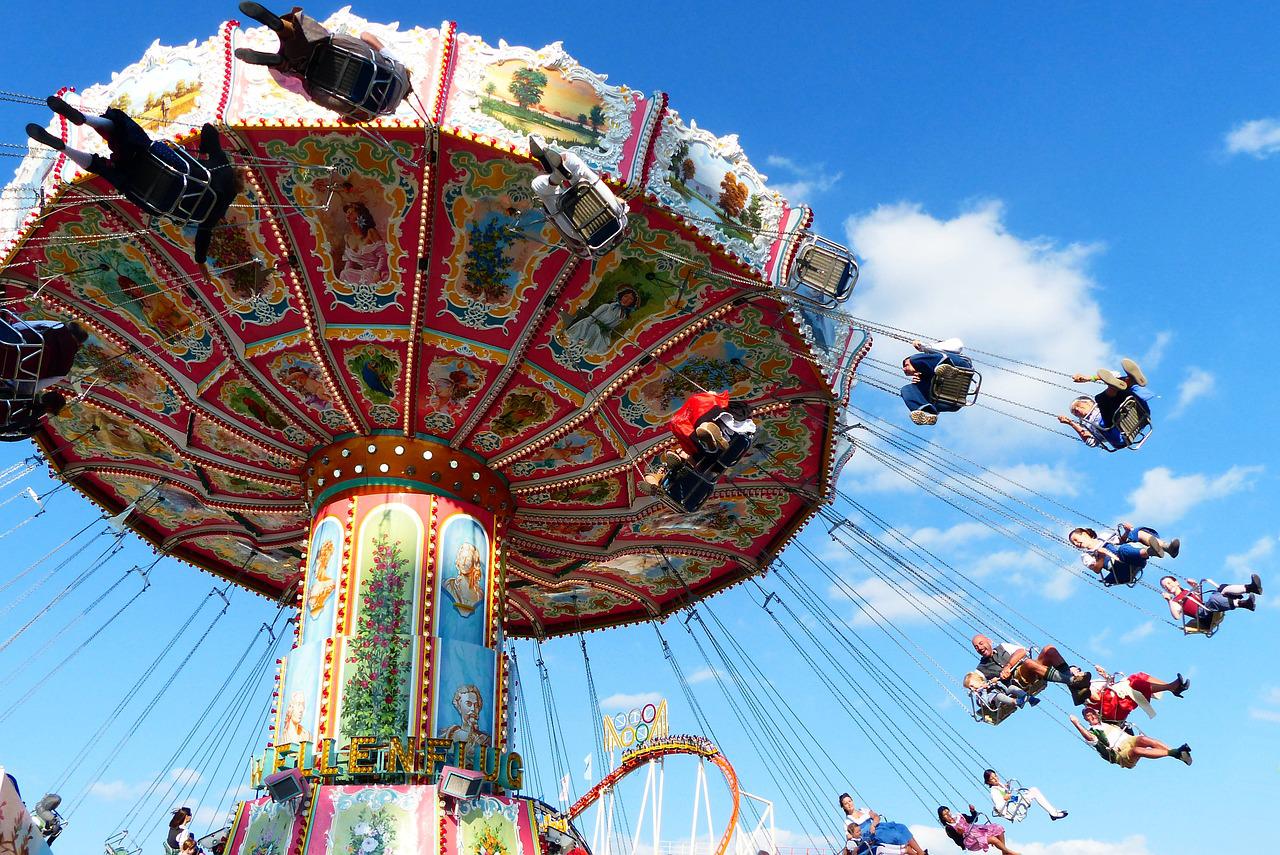
Often, Volksfeste taking place at the beginning of may include the tradition of
Maibaumkraxeln. A Maibaum is a 20- to 50-meter-high decorated trunk. This trunk is set up on the 1
st of
May. Some men then practise Maibaumkraxeln. They climb up the Maibaum
and ring the little bell on the top of the trunk. The only aid they get is pitch they can rub their hand and feet with so that they won’t slip. Afterwards the men (called
Maibaumkraxler
) are celebrated by the crowd and the Volksfest goes on.
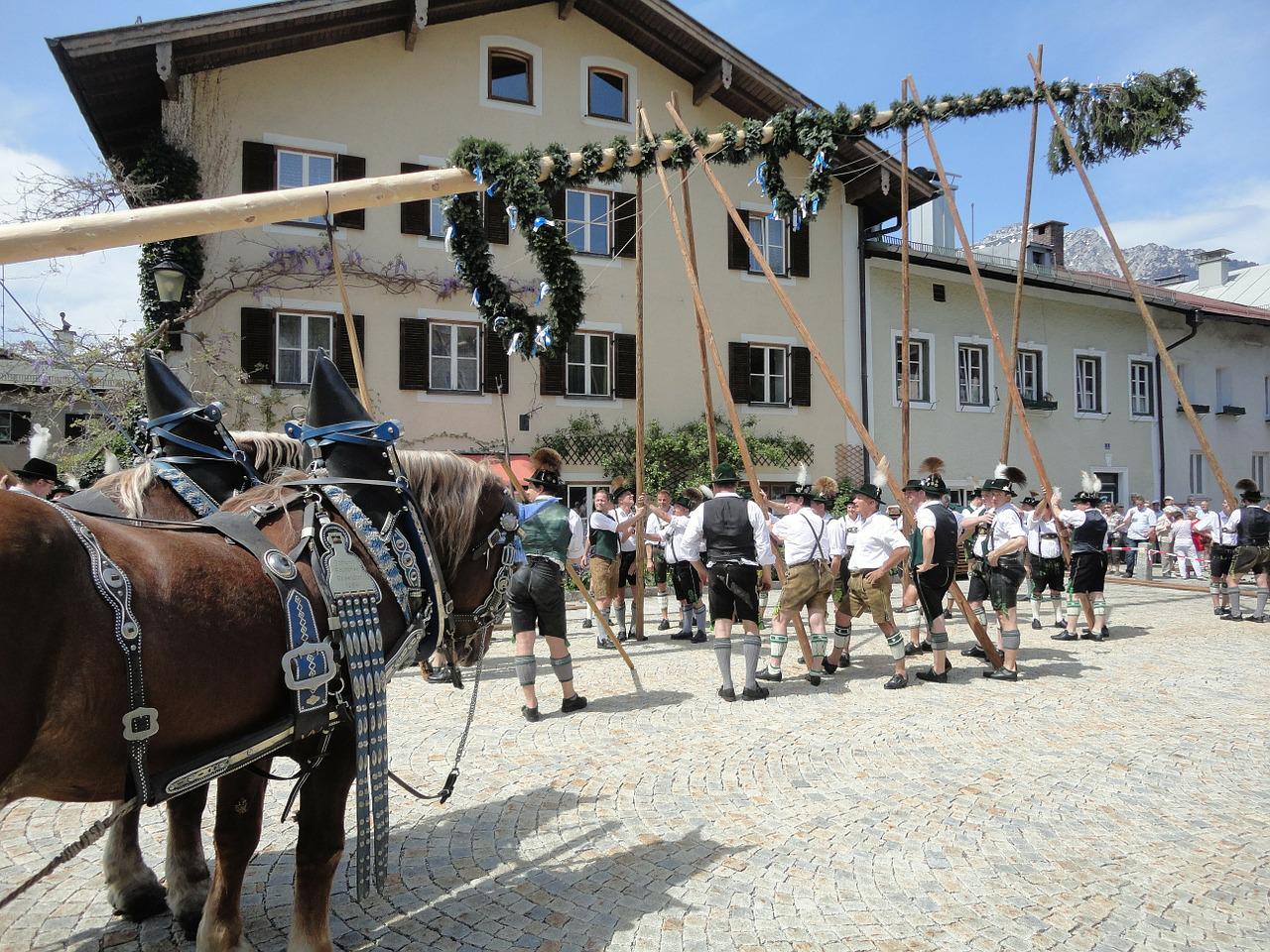
However, Bavaria is more
than just beer festivals. Bavaria is also known for its agriculture and traditional handcraft. In the region Rottal-Inn there are lot of producers offering an inside view to their work. With the project Rottal farm tour (Rottaler Hoftour)
you can visit several farms and learn something about how they produce – traditionally, regionally, fairly. Find more information on https://www.rottal-inn.de/en/economy-tourism/tourism/eating-drinking/
Pauline Kreis 22.04.2022
Short summary of all activities in the Rottal-Inn area
The university experience is more than studying and attending classes, and we all know that.
Friendships and activities to do in the area are equally important, and Rottal-Inn, although it might not seem at first, offers our students tons of different things to do.
We have already discussed some of them here at ECRI News, such as a day trip to Bad Birnbach, and the
lake near it, the Schönau Castle nearby,
or even neighbour Passau, among many others.
What more is there to discover, you might ask yourself…well, let´s see
Museums
Whether you are interested in nature, country life, history, art, and many other types of exhibitions; Rottal-Inn has the right museum for you. From Pfarrkirchen town hall museum to the open-air museum, be sure to visit them during your stay.
If you want to know about museums in the Rottal-Inn area, check here.
Bicycle tours
We have already done some posts about this, but some more are never too many!
Pfarrkirchen and the whole area is well-known for its bicycle tours, and if those shared by us are not enough, be sure to check all the recommended bike tours
here, and visit the tour portal here, where you will find all the bike tours around the district!
Highlights of nature
Are you more of a nature-lover? We got you. Rottal-Inn is an ideal place if nature is your thing, and there are many places, such as the Kaser stone room near Triftern, or the “Bürgerwald” in Eggenfelden (we have made a post about it already, check it here). To know more about nature´s diamonds in Rottal-Inn, check the official webpage here.
Adventure Park Voglsam
The adventure park in the Rottal-Inn district, which will reopen next Saturday, is a place of fun for both children and adults: with a go-kart track, hot air balloon flights, tree-climbing area, football-golf, and many others. Closed for a long time due to corona, it is going to reopen now, so don´t miss it!
Golf courses
If you like golf, the good news is, you won´t need to stop it during your time in Pfarrkirchen! There are two golfing courses, the Rottaler Golf Club in Herbestenfelden (very close to Pfarrkirchen); and the Bella Vista, in Bad Birnbach. Both with their unique qualities, great places for our golf-lover colleagues!
Parachuting and Tandem jump
For the more courageous and adventurous people out there, Rottal-Inn also has something to offer. Either for beginners or more experienced people, Exit Skydive offers different packages and lessons. If you are interested and would like to know more, contact them directly here.
Bowling, pool and other games
Either for just a night out, or if you prefer to take it as a regular hobby, the bowling centre in Pfarrkirchen is great for this! Some of our students already visited this place during the last pub crawl, and if you haven´t visited it yet… what are you waiting for?
More activities?
If you are still wondering what other activities you can do around the area, always check Rottal-Inn's official webpage (here you will find a summarized version in English, including the summer guide for the upcoming season, and here the complete version in German), or also the webpage of the city of Pfarrkirchen.
Ayelen Toscano Juanes 08.04.2022
Day visit to the Schönau Castel: getting to know the Rottal Inn region!
Did you know that just 10 minutes away by car from Pfarrkirchen you can find a beautiful small town, with nice and interesting history and, on top of all of that, a beautifully small castle surrounded by a quiet lake?Well, that place is called Schönau bei Pfarrkirchen, and maybe its time we get to know it!
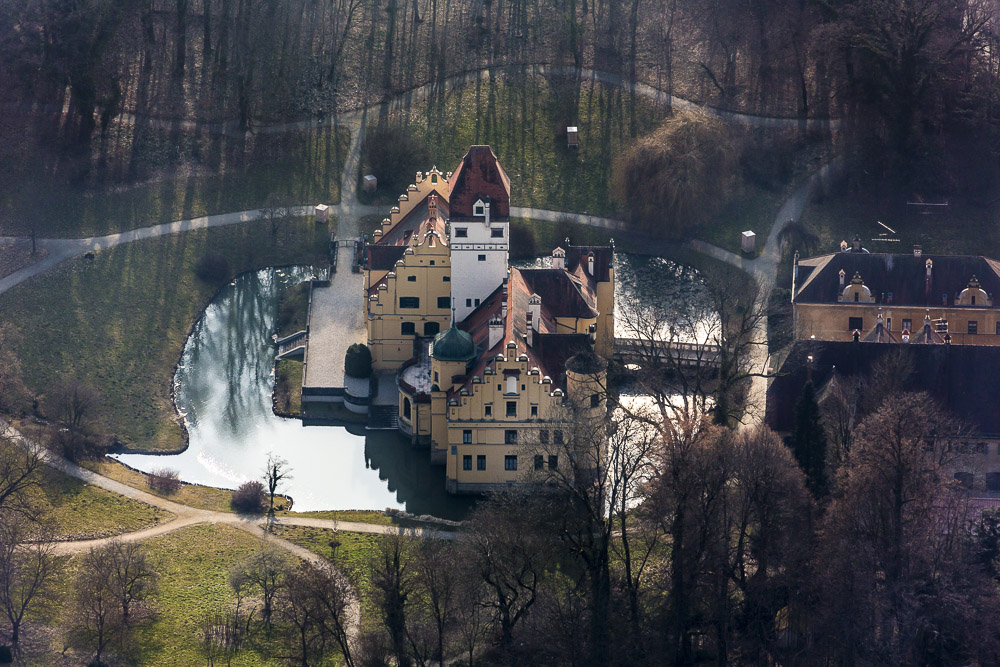
Photocredit: Klaus Leidorf / © 2013 Klaus Leidorf -- www.leidorf.de
Where is it?
This place that I´m describing, which could so well be taken out of the Snow white or Sleeping Beauty fairy tale, is just 10 minutes away by car, and there are daily connections with bus number 6211 from Pfarrkirchen´s main bus station (alternative stops: campus, gymnasium, and some stops in Postmünster). Bus timetable: https://www.gemeinde-schoenau.de/busfahrplaene/
With more than one thousand years of history, this small town has an enchantment on itself. If you want to know more about it, don´t miss all information available in their webpage https://www.gemeinde-schoenau.de/rathaus/geschichte-2/ (in German, you can translate it with the instant translator in your desktop).
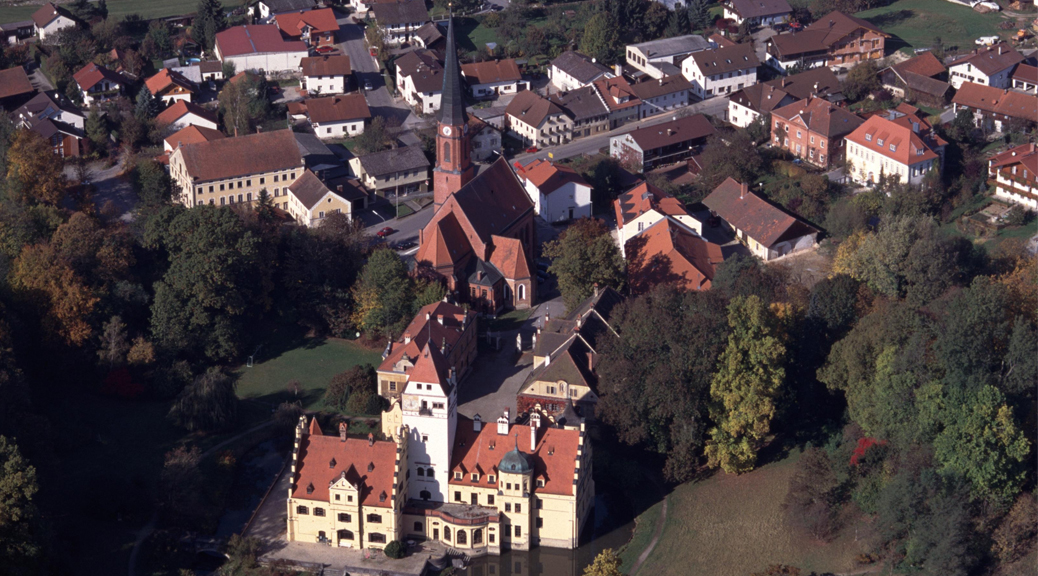
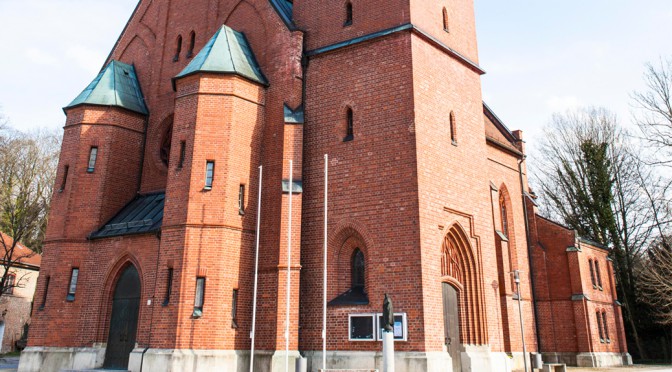
Photocredit: Gemeinde Schönau / Copyright: Gemeinde Schönau
About the Castle
Finding the castle is easy enough: just get off the bus station or leave your car in the centre, and from there is only 2 minutes by foot.
Buildt by Carl von Effner in 1867, the castle was inspired by the english garden in Munich. Later, between 1899-1900 the castle was rebuilt by architect Gabriel von Seidl, who expanded the park around it. More information on the castle´s history you can find at: https://www.gemeinde-schoenau.de/wasserschloss-schoenau/
The castle offers a beautiful view, place to sit and rest, and short walking paths. It´s just behind the historical centre, so you can go there beforehand or afterwards and enjoy walking through it.
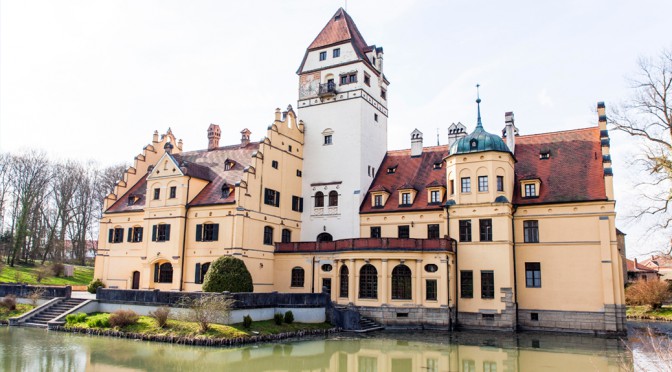
Photocredit: Gemeinde Schönau / copyright: Gemeinde Schönau.
What else is
there to do in Schönau?
There is a small café near the castle, in which you can grab a coffee to go and a piece of cake. Also, the small village has a bakery and some other shops, such as a supermarket, nearby.
For trekking and cycling fans, the local town hall has designed two trekking paths (“Around the Castle” and “through the forest and field”) which can be added on your day trip. They are easy and entertaining: https://www.gemeinde-schoenau.de/wanderwege/
When the situation allows it, the Voglsam adventure park might reopen. A visit to consider for your post-covid future!
All information retrieved from:
https://www.gemeinde-schoenau.de/
Ayelen Toscano Juanes • 13.05.2021
Back to Pfarrkirchen! Advice for your move-in day
Moving from one place to another can be quite stressful, especially if you are new to the area: from arranging different service contracts to getting furniture, the process might take you a couple of weeks.
Although renting
a WG (shared apartment between other students) might be easier, as normally all utilities, including TV-radio tax and internet, are included in the contract; but still some challenges might arise from the situation.
Here are some pieces of advice from our side!
Always ask your landlord/lady for a detailed description of what is included and what is not in the rent and clear out any doubts before signing the contract.
When moving into a new apartment, you might find in your renting contract the term “Warmmiete”, which means the final price with all costs included. Nevertheless, in Germany normally some services, such as electricity,
internet and the GEZ tax, are not included in the Warmmiete, and tenants must pay them themselves.
Some apartments, such
as one-bedroom student flats, might already include all these services in the final fee, though. In case of doubts, as your landlord/lady before signing the contract, or at least before moving in.
WG normally run differently. In this case, it is normally the person in charge of the whole WG (which can be the landlord/lady or the main tenant) the one in charge of paying for these extra services, and then they are
divided between all the tenants, including the fee in Warmmiete. Nevertheless, there are some cases of WGs in which the GEZ tax
fee has to be paid apart, or which does not include internet in the final fee.
Check if the rent is “pauschal” or not
If your contract says that the rent includes a “pauschal” (literally translated as flat-rate) on the extra expenses and utilities, this means that no matter how much you consume, you will not pay anything extra at the end of your
renting period.
On the contrary, if it doesn´t, that means that if you exceed any costs, your landlord/lady will have to send you a detailed declaration stating how much you exceeded, and you will have to pay the extra costs. If you live
in a WG, this amount will be divided by all the people who lived there during said amount of time.
On your first day, check your apartment / WG room and notify of any damages.
Normally, when moving into a new apartment you should fill out a document called “Übergabeprotokoll”. You need to include everything you see in these documents, such as scratches, holes, damages, etc. As a tenant in Germany, it
is your obligation to return the apartment in the same condition you found it.
In some cases, such as WGs, it can happen that your landlord/lady does not give you this document. You can always search one by yourself or ask
them to give it to you. If not, you can send a written document (such as an email or a letter) saying all the defects you find, so you are sure not to be blamed for them later.
Please also note the instructions from the
IO: How to care for
my apartment / flat room
Get furniture for your house
Although most student apartments and WGs come furnished already, some of them might not, or might not come with enough furniture.
You can find great, used furniture on ebay kleinanzeigen,
or even for free in some facebook
groups.
In case your apartment doesn´t have household appliances, such as washing machines or dishwashers, you can also rent them at a good price in Grover. The good thing about it is that if there
is a problem with the appliance, or if it breaks, they will change if you’re a new one. This is great for students who are only here for a short period, or a couple of semesters, or who plan to go back home during recess and only
rent apartments and rooms temporarily.
You can also use other tools to find used furniture, such as Facebook market, the local used furniture markets in Pfarrkirchen, or attend some Flohmarket in the area.
If you
need transportation for larger items, you can consult with local taxi
companies or moving
companies in the area.
Arrange all legal aspects
After moving into your new flat / WG, you should ask your landlord for the Wohnungsgeberbestätigung, a document (german / english) which states that you are legally renting that room/flat, and which will be required
from you when you try to register in the town hall.
After registering your new address in the town hall, don´t forget to inform every relevant party (such as a bank, foreigner’s office, among others) about your new address.
Also, to receive correspondence at your new address, you need to ask your landlord/lady, or the person in charge of your building, to add your name to the doorbell.
If you´d like to know more about accommodation
and tips on how to find an apartment, among others; we recommend you visit International Office “ECRI
Orientation Day” ilearn course.
Ayelen Toscano Juanes 01.04.2022
How to rent a room/flat and not dying in the middle of it: top tips for students. Part 1/2
Are you a new freshman student, looking for a place to rent? Or maybe you have been in Germany for quite some time, but there are still things you don’t get about renting? Don’t worry, here we explain easily everything you need to
know about renting a room/flat in Germany!
1- Contract
If you rent a room or flat in Germany, a rental agreement has to be signed between you (as a tenant) and the landlord or real state agency that owns the place. Contracts are a must, and there are some simple aspects that rental contracts must include:
- Name of both parties
- Length of the agreement (if there is a specified termination date)
- Amount of the basic rent
- Amount of additional costs
- Amount of the deposit
- Agreement of redecoration when you leave the place (if there is a decoration agreement)
- Rent increases (if there are any)
- In case of semi-furniture or furniture flats or WG, an inventory of all items
- General house rules, specially for WG and apartment buildings.
Other aspects, such as the tenant- landlord responsibilities and relationship, are usually codified in the law.
2- Termination date / notice period
When signing a rental agreement, be careful on what the termination date for said agreement is. This is also something you might choose to speak with your landlord beforehand.
Some contract can have a specified duration (one or two semesters, for example) while others might be indefinite. If the latest is your case, then the contract must also state a notice period: this means, how many months in advance you have to inform your landlord that you are leaving /want to terminate your contract.
By law, this period is three months, meaning that if for example you plan to leave your WG room or Flat by December 2021, you must inform your landlord by September at the latest.
Notice must be handed in a written form and at the beginning or middle of the month (1st or 15th).
3- Deposit
The Mietekaution (deposit) is security deposit that most landlords ask for when moving into a flat or WG, and which is later refunded when you leave the place. Nevertheless, if there is damage to the property, your landlord is legally allowed to withhold some part of the deposit to repair said damages.
The deposit can legally be an amount of up to 3 months of basic rent (Kaltmiete), though most landlords require for only one or two months of basic rent.
By law, the deposit must not be directly transferred to the landlord’s account, but rather into a joint savings account (Mietkautionkonto). This way, the landlord won’t be able to take the money without your agreement and at the end of the leasing period, you will get the interest of said money (as long as you don’t cause any damage to the property).
4- Taxes and services
Taxes are very important in Germany, and you must always be aware of which taxes you must pay. Generally, when you pay rent for a WG, all necessary taxes are being paid by your landlord (garbage disposal tax, municipal taxes, etc) but there might be some which are not included, and therefore is better to ask your landlord beforehand.
The most common tax which needs to be paid by the tenant is the GEZ Tax, known as “radio tax”. Every household in Germany must pay this tax and is the right to watch and listen all public channels and radio stations. Even if you don’t have radios or TV in your house, you must pay this tax as you can watch TV and listen to the radio online, with your computer. As mentioned, it is paid per household and not per person, which means that only one person in your house has to pay it (although normally every adult living in receive the notification, it is enough for one of them to pay it and the others to inform that that person is paying it with the number associated to the account).
In WGs, the landlord usually pays this import, but there are some which might ask you to pay it yourself. When renting a flat, it is usually the tenants’ responsibilities to pay it.
It is also important to notice that some services might not be included in your rent. Electricity and internet are the most common services which tenants have to pay by themselves, especially when you rent a house or apartment. WGs usually include these expenses.
Another relevant topic is whether the “Nebenkosten” (extra utility costs) are fixed or not. If they are not fixed then at the end of the year your landlord will make an evaluation, analyzing if you have consumed more or less of the agreed amount. If you have consumed less, you have the right to recover the different; but if you have consumed more, then you have to pay the extra costs. It is highly recommended to ask this beforehand and ask for this point to be written in the contract. In case your landlord informs you have consumed more and need to pay extra costs, he has to send you a detailed notification of how that occurred, with the corresponding invoice.
5- Recycling responsibility
Recycling is a very important aspect of Germany’s system and must be taken seriously.
In Pfarrkirchen, there are four different bins you will find outside your house: brown, black, blue and yellow. Brown is for compostable and organic elements, such as food, plants and others; blue is for cardboard, paperboard and paper; yellow is for plastic, and black for non-organic elements and mixed elements.
For glass and cans, you will find designated spaces all around the city, especially near supermarkets, where you can dispose glass also according to their type: white, brown, green or cans.
Separation of elements is very important and is not optional, but rather mandatory in Germany, and not doing it can get you into troubles, such as trash collectors not collecting for your household anymore, or even eviction in some
very difficult cases.
See also the article "Separating waste correctly in Pfarrkirchen" in this section.
Sources for this article:
https://www.howtogermany.com/pages/housing.html
https://www.studying-in-germany.org/renting-in-germany/
https://www.expatica.com/de/housing/renting/rent-in-germany-103803/
Also check out the app INTEGREAT for the county Rottal-Inn. Not all pages are available in english, so check out the german page as well.
Ayelen Toscano Juanes • 03/2021
How to rent a room/flat and not dying in the middle of it: top tips for students. Part 2/2
6- Which documents do I need to rent a room/ flat in Germany?
Though documents are a must when renting in Germany, mostly in big cities like Munich, Berlin or Hamburg; in smaller cities like Pfarrkirchen, and especially for student-apartments, landlords tend to be more flexible.
Nevertheless,
having these documents available will surely make it easier for you to show prospective landlords that you are a trustworthy tenant not only during your stay in Germany as a student, but also for your future.
So, the essential documents are:
- Copy of your ID or Passport(in case you are here with a visa, copy of the visa or residence permit might also be asked).
- Salary confirmation or bank statements. For students, this is not so required as for other tenants, but it might also be handy to have these documents ready. In case you do not have a job in Germany yet, a bank statement
from your block account or your normal bank account, which shows that you have sufficient founds to pay your rent, will be enough.
Have in mind that some landlords, especially in big cities, ask for tenants or the person responsible for the tenants to have a stable income of three times what the full rent.
Again, this is usually very flexible for students, but is information worth to have for your future life in Germany. - Credit Record (SCHUFA): This is an essential document if you have lived in Germany for quite a time.
It is basically a document which register your bank debt track, and helps landlords see if you can meet your financial obligations or not. It opens the moment that you arrive to Germany and register in the town hall, and it can show a better/worst record depending on your bank statements and your own record.
If you are new in Germany you won’t have it, and that is no problem: just speak with your interested real state agent or landlord and explain this to them.
It can help to bring your credit record from your home country.
To ask for it, you can ask for the free version at the SCHUFA webpage, or the paid one (30 euros) which is easier to read and more comprehensive.
7- Do’s and Don’ts in your rented room/flat
As everywhere else in the world, Germany has rules regarding things you can and can’t do in your rental room or apartment.
Some of these are very basic and common knowledge, while others might be specific guidelines or norms
for your apartment / apartment building: these are usually stipulated in the house rules, which your landlord has to handle you when renting your apartment.
Have in mind that this is a legally binding contract, and that by agreeing
with it you must follow it.
Some of said rules are:
- Avoid loud noises from 1 p.m. to 3 p.m.; and from 10 p.m. to 7 a.m.; and all-day during Sunday.
This includes loud cleaning, using noisy home appliances (like washing machines and dishwashers) and fixing things around the house that might be too loud. It is considered “loud” if any of your neighbours can hear it.
If you live in a WG, arrange directly with your flatmates, but have in mind that generally speaking, these rules apply for WGs too. That means you can’t use the washing machine or dishwasher after 10 p.m. (they have to be OFF by that time) unless you specifically arrange something different with them. - Wash and dry laundry only in designated areas by the landlord
- Be conscious when separating your trash and remember what we talk in point number 5.
- Ask your landlord for written permission if you want to keep a pet (unless it says otherwise in your contract).
- Leave cars, bicycles, baby carriages and any other equipment only in designated areas or areas provide by the landlord.
- Ask who is responsible for cleaning entrance halls and stairways, front hall, etc. It could be you!
- If you leave in a WG, ask your flatmates or landlord if there is a cleaning plan. In some house rules, not attaching to your clean plan could result in eviction, so be sure to follow it.
- Open your windows every day for 10 minutes, to allow fresh air and avoid mold and humidity.
- Install satellite dishes, television or radio antennas, without your landlord permission. And don’t install anything that might break local laws.
- Pour or shake anything from balconies or windows.
- Barbecues, grilling or an open fire on your balcony is prohibited.
8- Visits
Having visits is a normal aspect of social life, and what constitutes as a “visitor” is always a tricky aspect.
According to German laws, a visitor is a person that is occasionally visiting you and doesn’t stay more than six
weeks at a time.
If the person leaves for one day and then comes back, then the visitor status is restored.
Your landlord cannot charge you extra per day/night that somebody stays in your house, but if you do have a visitor
for more than six weeks, he can ask you to start paying extra utilities costs for them.
You also have to consider how many people stay at the same time in your flat/room and dimensions of it: if you have a one-bedroom apartment,
you can’t have three people staying there for more than a couple of nights, because that might cause an overcrowd problematic. Nevertheless, one person can stay there for up to six weeks without paying extra costs.
If you
are living in a shared WG, consider asking your flatmates first. One person staying in your room for a couple of nights might be fine, but for a longer period it can constitute an extra person living in the flat and cause problems
with the shared spaces and resources of the house.
If you know from the beginning of your rental period that somebody might be staying with you for longer period of times (boyfriend, girlfriend, spouse, child, etc.) you
might want to clear this with your flatmates before moving in.
Another aspect to consider is expenses. If you are paying a not-flat rate for your expenses and services (such as electricity and water), having somebody over
for a long period of time might incur in higher costs, which you have to pay at the end of the year.
If a person is going to stay for longer than six weeks, you might need to pay extra utilities cost.
During corona
time, be aware of local rules and regulations regarding the maximum amount if visitors.
Also, be aware that generally extra visitors count for the whole flat, and not for the individual tenants – that means, that if only one person outside of the household is allowed, and two of the tenants want to invite
their partners, those two partners would count as extra visitors. That would break the corona-contact-rule, and you might want to reach an agreement with your WG flatmates.
9- German terms for renting: all renting-related words you need to know
When searching for a flat or WG, there are some terms which might surprise you or you might nor understand.
Here is a list of the most common German renting-related terms.
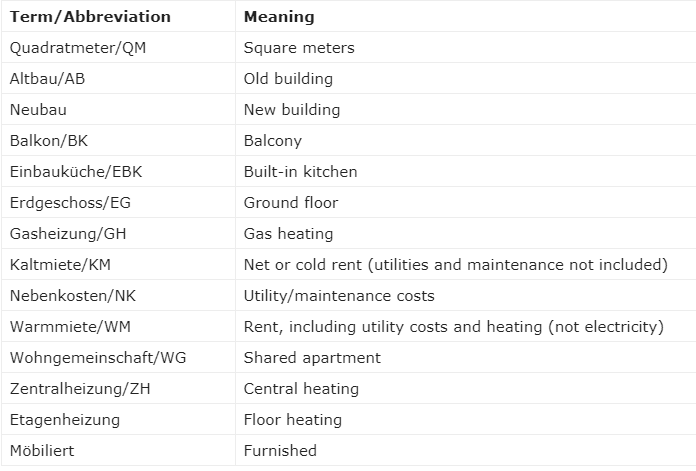
Source: https://www.studying-in-germany.org/renting-in-germany/
External sources used for this whole articles were:
https://www.howtogermany.com/pages/housing.html
https://www.studying-in-germany.org/renting-in-germany/
https://www.expatica.com/de/housing/renting/rent-in-germany-103803z
Ayelen Toscano Juanes • 02.04.2021
Travelling to Pfarrkirchen
A new, exciting semester started this week, and it is the first time in 2 years that students will finally have classes back at our European Campus in Pfarrkirchen!
Although this is great news, and we are all very happy to meet with our colleagues and friends back at our lovely ECRI, it can also create some logistical inconveniences for students who during the pandemic moved to other cities in or near Rottal-Inn, and need to commute to Pfarrkirchen on a daily or weekly basis.
If this is your case, don´t panic! There are tons of ways how you can get to PAN easily.
Of course, the easiest and most flexible way is to just come with the DB train.
DB runs many lines, and there is one (Passau – Mühldorf) that goes right through Pfarrkirchen. From Mühldorf you can connect with other trains to, for example, Munich, among many other destinations.
Train
ABO • Suitable for: long distance, almost daily, fixed route, only valid on the route here
If you are planning on using the train regularly, perhaps it would be convenient to check some promotions DB has available, such as the “ABO” card, where you subscribe for a whole year and you pay a specific rate for travelling between two destinations as much as you want. Find more information and how to order it here.
•••••
BahnCard, Trial BahnCard • Suitable for: long & short distance, flexible, spontaneous, valid throughout Germany
With a BahnCard 25/50/100, you can get during the duration of the card a discount of 25% / 50% or 100% on all DB journeys, as long as you travel with the card and your ID. You can check the conditions and fares here.
The Trial BahnCard 26/50/100 for 3 months is ideal if you are still unsure how often you want to use the train. Be aware! If you don´t cancel your Trial BahnCard; it will automatically be renovated for 12 months, and you will need to pay the full year-long fare. Be sure to cancel in time! You can find fares and conditions here.
Also, if you are 26 inclusive or below, you can get a discount on the BahnCard 25/50, with the so-called My BahnCard 25/50. Find everything about them and other special offers for travellers under 27 years old here and here.
•••••
Bayern Ticket, Südostbayernticket • Suitable for: irregular, spontaneous, groups of people
Here you should be aware of the Bayern ticket, which allows you to travel all day from 9 am – 6 pm during weekdays, and all day through Saturday and Sunday for 25 Euros. Each extra person would add 8 extra Euros, and you can include up to five other people.
For travels among the region (for example, if you need to reach Munich or Passau) you can also check the Südostbayern Ticket, which costs 20 Euros for the first person and 8 Euros per extra person. All rules (when can you use it, which days) are the same as the Bayern ticket.
If you are travelling further away than Bayern, then you should check the offers for the whole trip.
Campusticket from the VG Rottal-Inn
Combiticket Bus/Train • Suitable for: regularly and in the Rottal Inn region
If you are a student in the Rottal-Inn district, another great chance is to apply for the Campusticket at the VG Rottal-Inn, which will allow you to travel inside the Rottal-Inn area at really discounted prices.
The Campus ticket is a semester ticket with a duration of 6 months, and it needs to be ordered 2 months before the semester according to the VG Rottal-Inn starts.
Map of the area HERE.
More information about requirements, prices and conditions can be found HERE.
Carpooling, carsharing
Carpooling and carsharing are also two great, environmental-friendly possibilities of coming to Pfarrkirchen.
There are many platforms in which you can search for this in the Rottal-Inn and Bavarian region, but our top searches are:
BlaBlaCar, an online platform that allows you to mark from point A to point B and see how many possibilities you have of getting a shared ride.
Flinc, an app that allows you to share vehicles with your co-workers.
Rottal-Inn´s “carsharing central” (Mitfahrzentrale), in which you can register and search for shared rides around the area.
Or Bessermitfahren and Mitfahren.de which, such as BlaBlaCar, allow you to enter where and when you want to travel and find travel buddies or shared rides.
Others
Bike
You can find a map of the cycle paths in the area at the Pfarrkirchen Tourist Info or online at: https://www.rottal-inn.de/wirtschaft-tourismus/tourismus/radeln-wandern-tourenportal/.If you live in Eggenfelden, check our old post about bike tours around that area, which includes indications of how to get to PAN by bike. And for the ones living in Bad Birnbach, in our old article about the thermal spas in that area, we also included indications of how you can travel by bike between the two towns! Both articles can be found under this section, just scroll down to find them!
Bus
Another alternative to the traditional train is bus transportation, such as Regio and FlixBus. There is no FlixBus from Pfarrkirchen, but there´s from cities such as Mühldorf, Passau and Munich. So, depending on where you want to travel, FlixBus its combinations can provide you with a cheaper, more direct way to travel.Travelling by bus tends to take longer than by train, but if your destination is far away and plane tickets are too expensive (for example Holland, France, Denmark, etc), then travelling all night in just one bus, no changes, could be more comfortable than making 5 changes during the whole night. And cheaper, of course.
Taxi
And lastly, in case you need to move a lot of luggage out of your apartment, maybe a taxi would be the best option. In Pfarrkirchen there´re two taxi service options: Taxi Shala and Taxi Milles. Both companies also offer airport shuttle.Both offer great choices, with good tariff rates according to the legislation in the city of Pfarrkirchen.
For more information on taxi services in Pfarrkirchen, or in Rottal-Inn in general, you can read all about them here.
Apps
If you want to find more info on how to travel throughout Germany in general, you can always visit the Deutsch Bahn webpage; or pages such as Omio or Rome2Rio to search for different alternatives.Ayelen Toscano Juanes 18.03.2022
Useful information: vaccines at Rottal-Inn
Are you new in the area / Germany, and want to get vaccinated against SARS-COVID-2?
Well, good news: In Germany, every long-term resident (which as a student, you are) can get vaccinated for free with one of the approved vaccines!
Vaccination centre changes from 17.03.2022:
From 17.03.2022 the vaccination centre for the Rottal-Inn area will change its address and will move from its current location in Eggenfelden to Pfarrkirchen. In the future,
the vaccination centre's permanent address will be on "Am Griesberg" street, right next to the hospital.The moving efforts will start on 15.03.2022, and therefore it could be that during the 15.03 and 16.03 the vaccination centre remains close to the public.
For more information, visit: https://www.rottal-inn.de/meta/news/news-detail/impfzentrum-zieht-nach-pfarrkirchen-um/
General notes
You can also arrange an appointment with a Hausarzt (General Practitioner, GP). For this, you will need German health insurance (read our article on everything you need to know about GPs in Germany here).If you are already vaccinated, but your vaccine is not recognized in Germany, you need to make an appointment with a GP, who will inform you about your possibilities.
What shocked me the most about Germany, as an international student
When I first arrived in Germany, I was a 24-year-old Argentine coming to do an au pair experience in the city of Hamburg. Coming from Buenos Aires, a huge city with tons of possibilities, and travelling for most of my life around Latin America and Europe, Hamburg did not surprise me in the beginning. It was a big city, and I was used to big cities. It was loud, and people would speak different languages in every corner, but I came from one of the most multicultural cities in all of South America, so what could shock me? I thought.
Nothing!
Oh, dear…. I was so wrong!
My first month in Germany was like a honeymoon. I was in love with the country, the people, the culture, and I thought nothing could affect me, that the “cultural shock” everyone warned me about was just a myth, and that I would have the most incredible year of my life ahead of me. Well, that last bit was true, the rest… the rest not so much.
But after a month, I started to realize that this new country which I called my “home” had so many differences from my homeland, things which I had never thought of or expected…
One of the first things that shocked me as an international student/au pair in Germany, was the enormous number of legalities!
Everyone in Argentina knows that Germany is a hardworking country and that Germans follow the rules. We could see it when tourists came to our country and would follow laws and regulations that even Argentineans don´t follow anymore. But the enormous number of rules that I had to be aware of, could be overwhelming at times.
On the same line, there was something else which I had not expected from this country: the fact that here insurances are the rule, and everyone has them.
Imagine my surprise when I had a minor incident as a pedestrian, and the fellow person involved asked me for my Haftpflichtversicherung number. My Haft- what??? That was my answer.
I learned the hard way that in Germany you are liable for every action and possible damage (intentional or not) that you make. I also learned that day that it was also like that in my home country, but again – no one really knew that, so no one acted on it.
Going to the doctor was another big surprise for me. In my home country, going to the doctor is just like going requiring any other service: you call, make an appointment, and go. You either pay for it at the end or if you have insurance that pays it for you.
Here in Germany, outside of your general practitioner (and let me say, I had never in my life ever been to a general practitioner before!), you need a permit to visit most other specialists. Learning a whole new medical system made me realize how I had never considered that it might be so different in order places. Yes, during my travels I had to go to the doctor a couple of times, but those were emergencies that led me to the ER room, and that was it. Here was seeking medical treatment for a longer time and learning how to work around it.
At the same time, I was absolutely surprised when I learned that most medicines are included in your public health insurance, or they cost an extremely low price – that´s a go for Germany! The pharmacist laughed at me when I said, “ What?? I don´t have to pay anything!!? I´m sorry (Krankenkasse Name), I will not complain about how much I pay per month anymore!”
With time, some things that had annoyed me for the worst at the beginning of my stay ("No supermarkets and shops open on Sundays? What is that?") I started to like them, and when I left Germany, I started to miss them - Ahh I wish Supermarkets and malls would close on Sundays so my brother could have a day free with his family, I found myself thinking a few months later.
And things that took me a long time to get used to, like separating the waste into so many different types, became my mantra in life, allowing me to teach it to others – my mom is still fighting me because my brother reprehends her every time she mixes the compost with the recyclable waste, as, unfortunately, waste separation is not something common in my home country.
Adapting to the German lifestyle was hard, sure. It was difficult learning a lot of different tons of rules and adapting to a new culture, a new context, with systems working so different. A lot of ideas I had of how my country was changed in my mind, as I discovered a new reality.
But by the end of my year in Hamburg, I knew that I was someone else. I had learned a new and different respect for free time and friendship, and I learned that in Germany when you ask someone how they are, is not just a simple "hello" opening line, but that they will tell you about their whole day and emotions – or find it weird you are asking them that if you don´t know them.
I learned to have a new, more conscious way of thinking about the environment, which shaped completely the person I am today.
I learned to respect rules, and to be 100% responsible for my actions.
I stayed one year in Hamburg, and it was no surprise that later six months I came back to Germany, but this time to Pfarrkirchen. After all, I left Germany thinking that I knew that I would come back to this country one day.
Ayelen Toscano Juanes • 04.02.2022
General practitioner (Hausarzt): your best buddy in Germany.
UPDATE
We have received a tip about the article below and would like to refer to the overview of settle-in-berlin.com until the article is reviewed: Health Insurance in Germany
---
The following article may contain outdated sources and is currently being reviewed:
Finally, after so much trouble, you are here in Germany. You made your city hall registration, applied for a public or private health insurance, and are happily living here…So, what´s next?
After getting your health insurance card (Gesundheitskarte) is important to start looking at prospective general doctors (Hausarzt).
“Gesundheitskarte? What is that?” How to understand the German health insurance world.
In Germany, having a health insurance is an obligatory thing:
every person, since the moment they are born or enter this country (for a long-term stay, such as under a work or study visa) must be affiliated to a public or private health insurance.
If you are a European union citizen, you might not need to get a private health insurance, as long as you still have your family insurance. Not all countries allow this, so you might need to check first in your home country,
and then at one of the public health insurance locations in Germany, for confirmation.
This rule is NOT valid if you start working (under ANY type of employment) during your studies: the moment you start working, you have to affiliate to a German health insurance.
Public health insurances (Known as GKV, such as AOK or TK) cost around EUR 110 for students under 30 years old. If you are more than 30 years old, and were insured previously by a public health insurance, then you might continue with it, for a fair twice as much (Health insurance for mature students costs around EUR 200 per month).
If you are more than 30 years old, a student, and were never part of the public health insurance scheme, then you must affiliate with a private health insurance (PKV).
You can also change to a PKV Scheme if you are more than 30 years old, a student, and were in the public health system before, as you are no longer a mandatory member of the GKV. These ones cost from 28 to 80 EUR per month, depending
on what type of package you wish to have.
The main difference between public and private health insurance is that the first one cover not only you, but also all non-working and dependable members of your immediate family (such as children) and that you don’t have
to pay any extra costs for consultations, and treatments diagnosed by your doctor; while PKV are cheaper, but only cover particular individuals, and you must first pay costs by yourself, then sending the corresponding invoices to your
PKV, which will return your money.
Both systems have its advantages and disadvantages. It is important to remember that some students are obliged to affiliate to the public health insurance.
Why choosing a Hausarzt with so much time in anticipation?
In other countries, it can be very normal to just go to the ER whenever you feel sick. This is radically different in Germany, where primary doctors are still very important.
Here, having somebody that knows your clinical history and who you can contact whenever you feel something is not going right, is essential - because of this, it could happen that you go to ER for simple problems, but which could
be painful enough to require medical attention, and they just send you to your primary doctor.
Finding primary doctors that adequate to your needs and, in some cases, language skills, will be a huge benefit for your future
life in Germany.
They will be able to check you on a general basis, you can contact them for any health-related issue you might have, and they will refer you to specialists (Facharzt) in case you need one. This is especially
important for some specializations which are on demand in the Rottal-In region, and in which there are might not be many doctors, such as Gynaecologists. (Frauenarzt)
How do I find a general practitioner in Germany?
If you live in the Rottal-In region, check our contact list for this.
If you live in any other part of Germany, you can always
search through the Kassenärztliche Bundesvereinigung directory, and filter by “Hausarzt”. The Jameda website also provides
good search database.
Check some of these options online, filter them by comments or recommendations; or by convenience to your personal situation (distance, opening hours, etc.) - Remember to always call the practice beforehand, as you will need to
arrange for an appointment.
Appointments can take up to some weeks, especially if you are a new patient. Most doctors work at their own practice and hospitals, so they have limited general consultation hours.
Receptionists
do not always speak English, so it might be convenient to ask somebody who speaks German fluently to be there present when you make the phone call in case you need assistance. You can always ask the receptionist if the doctor speaks
in English (generally, they do).
When should I contact a general doctor?
For your first appointment, it might be convenient to start looking for one and arrange a meeting even if you are not ill. When calling, let them know that you are not a patient from them, ask them if they accept new patients, and ask
for a consultation appointment (so they know it’s not a priority, and give priority to ill patients). Arranging a previous consultation appointment is especially important if you suffer any preconditions, as the GP will be able to
research your medical history and organize appointments ahead of time.
During your first consultation appointment, the GP will ask you some personal and health-related questions. This is to build your medical history chart.
Have in mind that all personal, sensible information will be protected by German data protection policy.
How much does a medical appointment cost in Germany?
Individual doctor’s appointment do have a cost, which varies a lot, but is included in your health insurance plan.
If you are a member of a PKV, then the practitioner will tell you which is the cost for the appointment, but you
can later charge this cost to your private health insurance.
Ayelen Toscano Juanes • 16.04.2021
Separating waste correctly in Pfarrkirchen
Which collection containers are available?
Every region has a different system. Why? Depending on the region, different waste separation plants are used. Therefore, in some regions the yellow bin is available, in others a system of recycling centres.
Here we provide an overview
of the system in Pfarrkirchen (AWV Isar-Inn):
- Grey/black bin: non-recyclable waste
- from January 2021 there will be a yellow bin in Pfarrkirchen: light packaging made of plastic, aluminium, tinplate or composite materials such as beverage cartons (until then, please dispose of the above-mentioned waste at the recycling centre)
- blue bin: paper/cardboard/carton
- glass collection container: container glass and bottles
- brown bin: organic waste
- Waste App of the AWV Isar-Inn (collection calendar, current opening hours of the recycling yards and composting places, dates of the problem waste collection, the waste ABC, contact persons, ...)
- Abfuhrkalender • waste collection calender
- FAQs
- THD Blog: Recycling in Germany • a quick guide to recycling in Pfarrkirchen • Haneul Choi
Haneul Choi • Anna Marquardt • 10/2020
3rd of October, day of the German reunification: what is celebrated on this date?
This Sunday will not be just any other Sunday for German citizens and residents: this Sunday will also be the 3rd of October, Germany´s national day, where the whole country comes together to celebrate their 31 years together as a united nation.
But why is that? And why specifically on that day?
A country divided in two
As many of us know, until 1990 Germany was separated in two different countries: the Federal Republic of Germany (FDR, for its initials in English, or BRD, in German); and the German Democratic Republic (GDR in English, DDR in German).
In the aftermath of the Second World War, Germany was divided into 4 military zones, each of them controlled by one of the allied countries: United States, UK, France and the Soviet Union. In 1949, the three regions formerly controlled by USA, UK and France formed the FDR; and the region formerly controlled by the USSR formed the GDR.
Life in these two countries was radically different and contact between them was rare, given the global context they were living in.
In times of the Cold War as its highest peaks, the situation became even more strangled with the creation of the Berlin Wall: a Wall surrounding all East Berlin and separating it from West Berlin. The situation maintained so for many years to come, with people from both sides needing extensive permission to visit family & friends on the other side, until 1989.
When did things start to change?
Around the year 1989, protests started arising all around the GDR and other eastern European countries. In what became known as the Monday Demonstrations, GDR citizens started asking for political reform and opening of the borders. Finally, on the 9th of November of that same year, after a confusing press conference given by the GDR leadership, borders were open and people from West and East Germany started crossing it, being able to freely visit their relatives. The event was broadcast all over the world, people travelled to Berlin to witness this moment. This day marked the end of the Berlin Wall, which started a formal demolition process later after that day, and the end of the separation between the two countries.
When did the GDR and the FDR finally unite again?
Not even a year after this event, on the 3rd of October, 1990, the official reunification papers were signed. The 3rd of October was chosen as the day to celebrate the rebirth of a united Germany, and the new country maintained the name used by the state formerly known as West Germany: Federal Republic of Germany.
From that day forward, Germans celebrate their national day on the 3rd of October, without passing this celebration to any other day.
How is the Germany Reunification Day celebrated?
In contrast with other country´s national day celebrations, Germans choose to celebrate their national day in a more pacific way. There is no big military parade or great fireworks all around the country; though each year one city is chosen as the official celebratory place; where politicians can give their speech and some fireworks are displayed.
There are some celebrations in main cities, but most Germans choose to celebrate this day by meeting with their family and closest friends, organizing a quiet lunch or picnic, if anything at all.
As said by Tuya Roth, director of the “House of the History of the German Republic”, in Bonn, this day “Should be an occasion for joy and celebration, not for a state to put itself on display. It is linked to a moment in German history” (Christ, 2014).
What is widely common, is that during this day most shops and businesses are closed; people do not go to work, and schools and other educational institutions close for the day.
After all, the German Reunification Day is the only nationally celebrated holiday, as all others depend on the regulations given by each federal state.
If you want to know more about the Berlin Wall, life on the GDR or the German reunification, we recommend you these movies and documentaries:
- DW´s “A history of German reunification”: https://www.dw.com/en/a-short-history-of-german-reunification/av-35944426
- Netflix´s “A perfect crime”, about the different perspectives and experiences of East Germans during the reunification period.
- DW´s documentary: “1949- one year, two Germanies”: https://www.youtube.com/watch?v=dMVq4jj1QtE
- DW´s “The Berlin Wall, our family and us”, an incredible documentary about three different generations, one born before, one during and one after the Berlin Wall, and how that event shaped their lives in the former East Germany: https://www.youtube.com/watch?v=TWpCj8jIxkY
Sources:
https://www.timeanddate.com/holidays/germany/german-unity-day
https://www.dw.com/en/how-germans-celebrate-their-national-holiday/a-17973087
Ayelen Toscano Juanes • 3.10.2021
Interview • Georg Riedl about bees

Picture: Sieglinde Hankele
Georg RiedlUniversity coordinator
but most important: passionate beekeeper
“Bees take me to the heart of nature.”
Facts and figures
10 beekeepers' associations with 732 members who look after 5.114 bee colonies in the district Rottal-Inn
11 members under the age of 18
4 training apiaries (open days and information event)
75 district associations in Bavaria, 32.284 members, 201,236 colonies
How many beekeepers are there in the region (2020)?
The number of members is increasing, but the number of bee colonies is decreasing. About 10 years ago, a beekeeper
looked after an average of 13 colonies, now there are only about six colonies.
The rapid decrease may be mainly due to the fact that beekeeping has become much more time-consuming due to the adverse effects of the Varroa
mite (a parasite, not a disease, that affects the colonies) and diseases. There is a relatively high turnover of new beekeepers but many are not aware of the intensive workload that awaits them because they simply thought it
was ‘chic’ to keep bees.
What does a beekeeper do, what are the main tasks?
Working with bees requires a steady hand, a sure instinct and basic knowledge of honey bee biology. One must be able to analyse the bees' behaviour and draw the right conclusions from it. Questions from new beekeepers show repeatedly that apparently knowledgeable beekeepers tell some old wives' tales; this can harm the bees.
The beekeeper must also be able to recognise suitable locations. The honey bee is a descendant of the forest bee that has been around for millions of years; sunshaded areas are not suitable for them since it does not correspond to "animal welfare"! It is very important for the beekeeper to be able to assess the hive situation and the nutritional status of his colonies. Unfortunately, it happens again and again that colonies are harvested too much.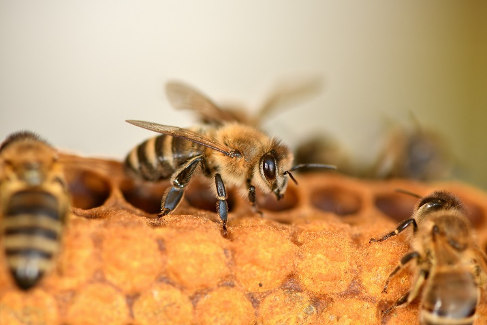
Picture: xiSerge on Pixabay
As already mentioned, the beekeeper must be able to guide his bees through the entire bee year. This includes wintering, swarm control, honey harvest, feeding, wintering, but above all treatment against the Varroa mite and, if necessary, other parasites and diseases.
The beekeeper bears a great responsibility for the health of the bees. One must keep an eye on the development, strength and state of health of the colonies in order to be able to carry out treatment measures properly and professionally.
Another important point is the formation of young colonies. This includes the formation of scions and artificial swarms as well as the breeding of queens.
I keep a record of each colony and write down what I have noticed or
what still needs to be done with the colony.
Care must be taken when handling wax. The beekeeper must be able to assess the combs of his colonies, separate out old combs and melt them down. This also includes the proper
cleaning of the hives and equipment.
Which season is particularly busy?
There is actually no season in which the beekeeper can be lazy. Even in the winter months, the beekeeper is challenged. The frames are renewed, repairs are carried out, the honey is marketed, and much more.

Picture: Free-Photos on Pixabay
“The beekeeper must guide the bees.”
Wild bees - honey bees - competition or happy coexistence?
In our latitudes, it is estimated that there are about 550 species of wild bees. Unfortunately, almost half of them are threatened with extinction. Wild bees
and honey bees complement each other. For example, the bumblebee is already on the move at relatively low temperatures and visits flowering plants, while the honey bee does not fly out below temperatures of 10 degrees. A small
proportion of wild bees can also sting.
How long does a bee (female honey bee) live?
They have a lifespan of 38-45 days in summer. Winter bees are born in autumn and overwinter in the hive. The life of the honey bee is as follows: first it is a nurse in the hive (feeding, cleaning, caring,... ), then a collecting bee until death. The queen bee lives up to 5 years.
Communication in the beehive - there is dancing
Bees communicate via different dance styles, this also works in the dark hive. Food sources in the immediate vicinity are passed on via the round dance, more distant locations
are passed on with the tail dance. If a forager bee/scout returns with good nectar, she is asked by the others through feeler contact to describe the location.

Picture: Sztrapacska74 on Pixabay
Depending on the location and season, different sources can determine the composition of the honey. Varietal honey is more likely to be found in large honey fields. With flower honey, nectar (and pollen) is collected from flowering plants. Forest honey is a symbiosis of louse and ant: the collecting bee, the aphids on the trees release the "dew" (stimulated by ants), the honey bees suck it off with them (honey stomach).
The forest honey must be removed from the hives by the beekeeper especially before winter, bees cannot digest this honey well and thus have less chance to survive the winter. It is important for the beekeeper not to remove too much honey, yes, depending on the availability of food sources, the beekeeper must also supplement with sugar solutions.
Where to put the honey jars?
Be sure to rinse them out before disposing of them in the glass container. Depending on where the honey comes from and how it was produced, it may contain diseases and germs from other countries.
Does honey go bad?
The expiry date is 2 years with a water content of max 18%. "Hard honey" is not bad, it is quite normal that it candies. Honey should not be heated above 40°, the components will be destroyed and you will only have sugar.
Help a bee- or: Is a beehive near a house dangerous?
No, it's not dangerous. Keeping 2 metres away from a colony is good, you shouldn't stand in the flight path either. Don't stress, don't wave, just leave it alone, then
the bee will leave us alone. If the bee stings, it is only to defend itself, its aim is not really to sting, it dies afterwards.
City projects
During my time as mayor, I started to plant meadow orchards, especially with old fruit varieties, without any state support. At that time, the legal regulation of so-called compensation areas did not yet exist. During this time, we planted over 300 fruit trees in various places in the city. The first orchard was planted in 1991 at the south entrance, west side of the Mooshof housing estate. In the meantime, the trees are large and productive.
My successor is continuing this important ecological measure, which makes me very happy.
“I still haven’t finished my training.”
Conclusion
I have been keeping bees for exactly 53 years; my father and I took them over from my grandfather when he was 90 years old. Back then, I brought the colonies from my grandfather's farm to Ingolstadt with a small truck from
Altheim near Landshut. At present I have 20 bee colonies and if I'm completely honest, I still haven't finished my training. What still fascinates me about beekeeping today is that the bee takes me to the heart of nature. The
honey bee and the wild bee are practically a state indicator of our environment. They clearly demonstrate to us that we may only live from the interest of nature, but not from its substance; unfortunately, the latter is the
case.

Picture: Hans on Pixabay
Verena Frank & Anna Marquardt • 09.07.2021
Understanding German phone contracts
As students, we know how important connectivity is, especially during online learning times. If you are coming from abroad, one of the first things you´ll need to do is get a German SIM card for your phone. With many different plans and contracts, here we briefly explain you what your different options are.
First of all… is your phone compatible? One of the first things you must check, is if your phone is not encrypted or “blocked” only to be used with one specific company back home.
If you want to buy a new phone, you can always check the local tech stores; or there are also many online webpages where you can get a new phone in just a few days.
What do I need to start a contract/plan?
You will need a German address (for contracts, the town hall´s registration certificate will not be necessary, but for prepaid plans yes) and your ID (passport, European ID, etc.).
If you purchase a post-paid contract, you will probably do it at their offices/contact centres, and they will ask you for your ID and verify it there. But if you buy a prepaid SIM card, then in order to activate it, you will have to certify your identity by video phone call or through the post system, so having your registration certificate and ID nearby will be necessary.
Pay as you go, phone contracts… what is the best option?
As any other country, Germany has many different possibilities when it comes to phone contracts and deals.
The most usual one, is phone contracts with one of the main three companies – Deutsches Telekom, Vodafone, or O2 (owned by the Spanish mega telecommunications company, Telefonica).
Contracts usually go from 20 to 40 euros per month, with packages from 3 to 10 gigabytes, SMS and illimited calls to other mobile phones in Germany. Nevertheless, phone contracts in Germany are normally for 24 months, and you can´t cancel them at your own convenience (with a few exceptions). This is something you should seriously consider, specially if you are not going to be here for a long period of time.
And, even if you are planning on staying here for longer period of time, remember that maybe what seemed like an incredible offer once, can be less two years later.
Another option, the most common one among expats, is to get a pay-as-you-go or prepaid contract. In this case, you first buy a SIM Card and activate it. Then you will have many possibilities: you can just top it up when you need, and use it just for that, or you can purchase a 4-week plan, which will be much more advantageous. You don´t commit to any contract, and once you run out of credit, it will just stop working.
If you don´t use your SIM card for a prolonged period (6 months or 12 months, depending on the phone company) then it will be cancelled, and you would have to get a new SIM card.
All big supermarkets (Lidl, Aldi, Real, etc) offer these SIM cards and plans (Aldi Talk, Lidl Connect, Edeka Mobile, Tchibo mobile, among others). These companies don´t run independently, but rather form business connections with the three main phone networks in Germany, so basically you are always using that same network.Always make sure to tick off any conditions that might tie you into a contract, or with extra charges.
For prepaid plans, there is no notice period as there is no contract.
What if I want an unlimited data plan?
Unlimited data plans are not so common in Germany, but the two biggest companies (Telekom and Vodafone) do offer some. But, be aware: they are going to be VERY expensive (up to 80 euros per month).
Sources for
this article:
https://www.your-german-mortgage.de/german-mobile-plans/
https://www.settle-in-berlin.com/mobile-phone-germany-providers/
Ayelen Toscano Juanes • 30.04.2021
Blog article • Everything you need to know about Pfarrkirchen
After months of planning, you have finally arrived to Pfarrkirchen: congratulations! We know that you might have a million questions regarding all formal process and procedures, but we encourage you to discover the entertainment
opportunities the city has to offer from the beginning, aas this will certainly help you in your adaptation process!
Because of this, we have prepared this blog post on social and cultural life in Pfarrkirchen. The article contains information on what to do in the city and nearby cities; and also tips on social and cultural norms in Bavaria.
We hope you enjoy it! And as usual, if you have any questions, feel free to contact us.
Ayelen Toscano Juanes • 19.03.2021
Civic Engagement
|
Landratsamt Rottal-Inn Ursula Müller Phone: 08561 20-192 eMail: ursula.mueller@rottal-inn.de |
Coordination Office for Civic Involvement
In the district of Rottal-Inn, civic engagement is characterised by great diversity. More than 1400 associations show a great willingness to engage themselves voluntarily in different areas. The Coordination Office for Civic Involvement is there to support this willingness. The tasks of the Coordination Office for Civil Involvement are the networking of existing offers and the initiation of new forms of civic engagement. It is intended as a point of contact for people or organisations looking for advice, networking opportunities, as well as the placement of volunteers and those who are looking for volunteering openings. |
Sonja Geigenberger Phone: 08723 20 25 22 Mobile: 0151 70 34 48 28 eMail: info@pack-mas.bayern |
Voluntary Agency • “Pack ma’s“ “Pack ma’s” is Rottal-Inn’s voluntary agency. It is a regional contact and information point on civic engagement. The agency informs, advises and arranges voluntary commitment. “Pack ma’s” connects initiatives, organisations and volunteers and is committed to a good regulatory framework for civic engagement. The agency works locally, regionally and at county level. Together with citizens, associations, initiatives as well as representatives from politics and industry, “Pack ma’s” wants to contribute to a strengthening of community and public spirit. They also do so by initiating their own projects in different areas to create opportunities to get involved. |
More information about associations, contact points and first contact persons in Pfarrkirchen can be found here: https://th-deg.de/ecri
This document is constantly updated, it's always worth having a look on it.
Easter
For many, Easter is also always the beginning of a new season, spring. And the Easter holidays are usually the first date in the new year when the whole family meets for the Osterbrunch, the first walks enjoying the sun and of
course hides and looks for eggs.
The term "Ostern" has German roots. According to the German dictionary of the Brothers Grimm, the spring goddess Ostara,the goddess of spring, gave Easter its name.
Here are a few easter traditions presented, which do not always have a religious background:
Gründonnerstag
On Gründonnerstag, a lot of fresh greens are eaten and the first preparations for the Easter Weekend are made. The fresh green food is supposed to give health and strength for the whole year and also represents the new beginning of spring. The whole family meets, dyes eggs together for Easter Sunday and cooks together chervil soup (soup from various meadow herbs, in our region mainly with chervil) and there are the first potatoes with spinach and nettle.
Karfreitag
KarfreitagsratschenAfter the Gloria at Holy Thursday Mass, the bells are silent, because according to old popular belief, the bells now fly to Rome and do not return until the Easter Vigil. Now comes the hour of the Good Friday rattles (Karfreitagsratschen).

Karfreitagsratschen
are special sound instruments made of wood that make a rattling or clattering sound. Piercing and loud. But why? This has religious origins. Good Friday is one of the most important holidays in the church year and is part of Holy
Week, also called Silent Week (Stille Woche). That is why it is also called "Silent Friday" (Stiller Freitag). As the bells are now silent, Karfreitagsratschen briefly take over from the church bells. They call the parishioners
into the church for mass.
Karfreitagsfisch
On Karfreitag in Bavaria is traditionally eaten fish or lighter dishes. It is worth ordering the fish in advance, but many markets also offer fresh fish from the region (usually char or trout) during Easter week.
Karsamstag
Karsamstag is used to prepare for Easter Sunday. On this day, tasty specialties are baked, such as the Easter braid on yeast dough or the Easter lamb made of sponge cake dough, which are eaten on Easter Sunday.
Depending on the region, the great Easter fire is lit on Holy Saturday night, which is supposed to drive away winter and its evil spirits. The fires also welcome the spring and represent growth, good harvest and fertility.

To drive away winter and prevent misfortune, Pfronten in the Allgäu has the tradition of Fuirspringen on Holy Saturday. Long before this day, beech sponges are searched for in the forest, dried and then attached to a long stick. Very early on Holy Saturday, these beech sponges are lit on a consecrated fire. The good-smelling sponges are now carried from house to house to distribute individual "Zunzeln". In this way, rooms, stables and barns are smoked out, winter is "driven away" and misfortune is prevented.
Ostersonntag & Ostermontag
Easter Sunday and Monday are traditionally days for the family. Families meet for a brunch or a walk and play some special Easter Games:
Ostereier suchenWhy are eggs boiled, dyed, hidden and searched for? The custom of Easter egg hunt probably comes from different traditions and rituals, clearly can not be explained. During Lent before Easter, eggs were also not eaten. But the hens
did not stop laying eggs… to make them durable they were cooked.
But why colorful? Because it is easy to seperate the raw ones from the cooked ones.
Theory about hiding • Hiding Easter eggs
is as much a part of Easter as coloring them in advance. But why do we hide eggs for others to search? It is said that eggs were given away as present to celebrate Ostara, the goddess of spring. Eggs have always been considered
a sign of fertility. The church was not amused about that tradition, therefore the eggs had to be passed on in secret, they had to be hidden.
Eier pecken • Oarpecka
In "Oarpecka", boiled eggs are beaten with their tips. The person whose egg is damaged first has to give it to the winner.
Eier schieben • Oarscheim
Von Andy Pillip. https://commons.wikimedia.org/w/index.php?curid=19922448
In "Oarscheim" (egg pushing), boiled eggs roll over the sloping handles of two parallel rakes. Everyone has two eggs. After the first pass, a coin is placed on each egg. Whose second egg pushes the coin off another egg gets
to keep the money. The winner is, of course, whoever has the most coins at the end.
https://youtu.be/kug6UN32e9A
While winter is symbolically driven away on Holy Saturday in the Allgäu, this is done in Traunstein in the Chiemgau on Easter Monday with the Georgiritt. The Georgiritt is one of the best-known horse pilgrimages in Bavaria.
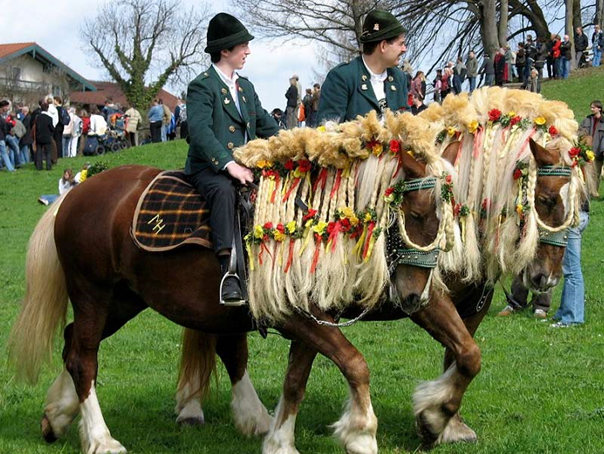
Since
May 2016, this tradition has been considered an Intangible Cultural Heritage by UNESCO. The Georgiritt was first mentioned in 1762. Every year on Easter Monday, around 500 horses, festively decorated wagons and bands parade through
the streets to celebrate the beginning of spring. In honour of St. George as the patron saint of horses and riders, blessings are traditionally requested for animals, field work and the stable at home.
https://www.youtube.com/watch?v=8txksHckfy8
Claudia Nikitsin & Anna Marquardt • 03/2021
